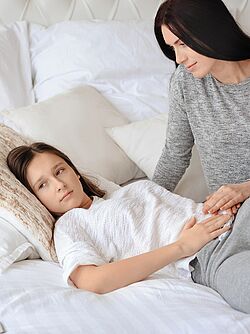
Diarrhoea
Defined as more than three loose or liquid stools a day, diarrhoea is one of the most common health problems affecting children worldwide.
The information on this part of the website is intended only for health care professionals.I am an expert within the meaning of Act No. country xy. I herewith confirm that I am a professional according to this definition.
Unfortunately, as you are not a health care professional we cannot provide you this information.

“I’ve got a bellyache” or “my tummy’s sore.” Most parents have heard something like this from their children. While a bellyache every now and again is normal and common among children and adolescents, up to 38 percent of them experience stomach pain every week. If this persists, it could be functional abdominal pain (FAP).
Usually, the discomfort is located around the belly button, but the pattern and location are not always predictable. Stomach discomfort can occur suddenly or gradually. Mostly, children are otherwise healthy and happy, but over time abdominal discomfort can lead to them feeling sick, worried, or tired, interfering with school, sleep, social activities, and family life. If this happens, it is time for parents to seek medical advice.

The precise cause of abdominal discomfort is still unclear, but it seems to be an interplay between genetic, physiological and psychological factors. The condition tends to peak at 5 to 7 years when they start school and then again at 8 to 12 years of age.
It is estimated that 10 to 20 percent of schoolchildren suffer from functional pain disorders and functional abdominal pain is more common amongst girls than boys.
The connection between our mental well-being and digestive system is subject to increasing interest in the world of research. This period of a child’s life is marked by many major changes, which can cause emotional strain. So, it is no surprise that psychological factors such as stress and anxiety can cause or worsen stomach discomfort. Another possible trigger could be a disturbance in gastrointestinal motility (muscle contractions in the digestive system).


Since stomach discomfort can have such wide-reaching effects, which go beyond the symptoms themselves, it is important to help and support children experiencing this condition.
Firstly, it is essential for parents to show support and reassurance without displaying too much anxiety or worry to the child. It could also be helpful to identify possible triggers such as certain foods, specific situations or environments, and bowel movements. In addition, probiotics have become a well-recognized option for supporting the bacterial balance in children’s gut flora and reinforcing good bacteria. Limosilactobacillus reuteri Protectis can help to supplement the gastrointestinal microflora in children experiencing stomach discomfort.

Defined as more than three loose or liquid stools a day, diarrhoea is one of the most common health problems affecting children worldwide.

When a child has infrequent bowel movements, or difficulties going to the toilet, it could be constipation. Here we look at symptoms and gentle ways to provide relief.

Taking care of children's teeth sometimes seems like an almost superhuman feat. The popularity of children in all kinds of goodies, sweets and the not very widespread desire to brush their teeth certainly does not help to fulfill it.